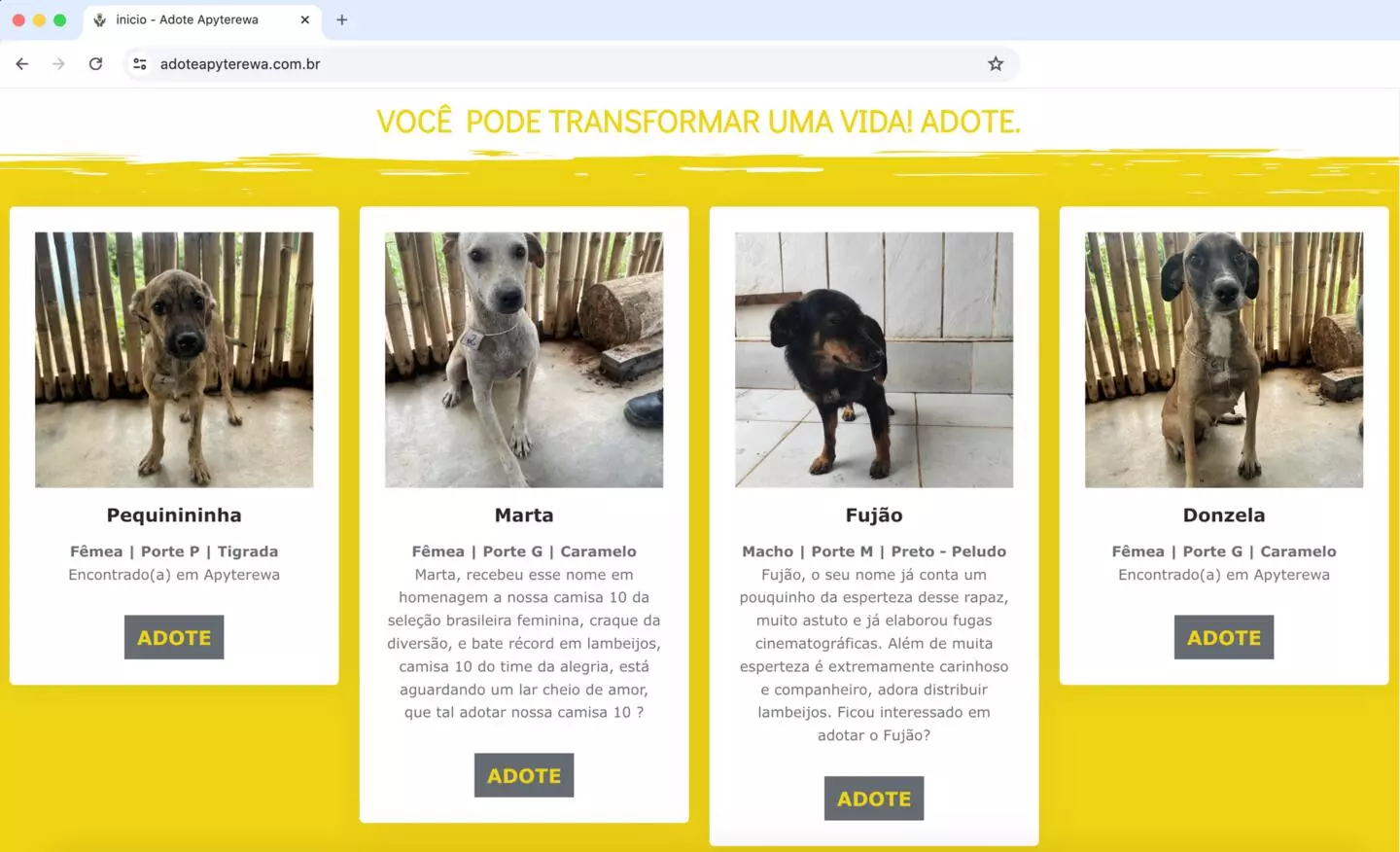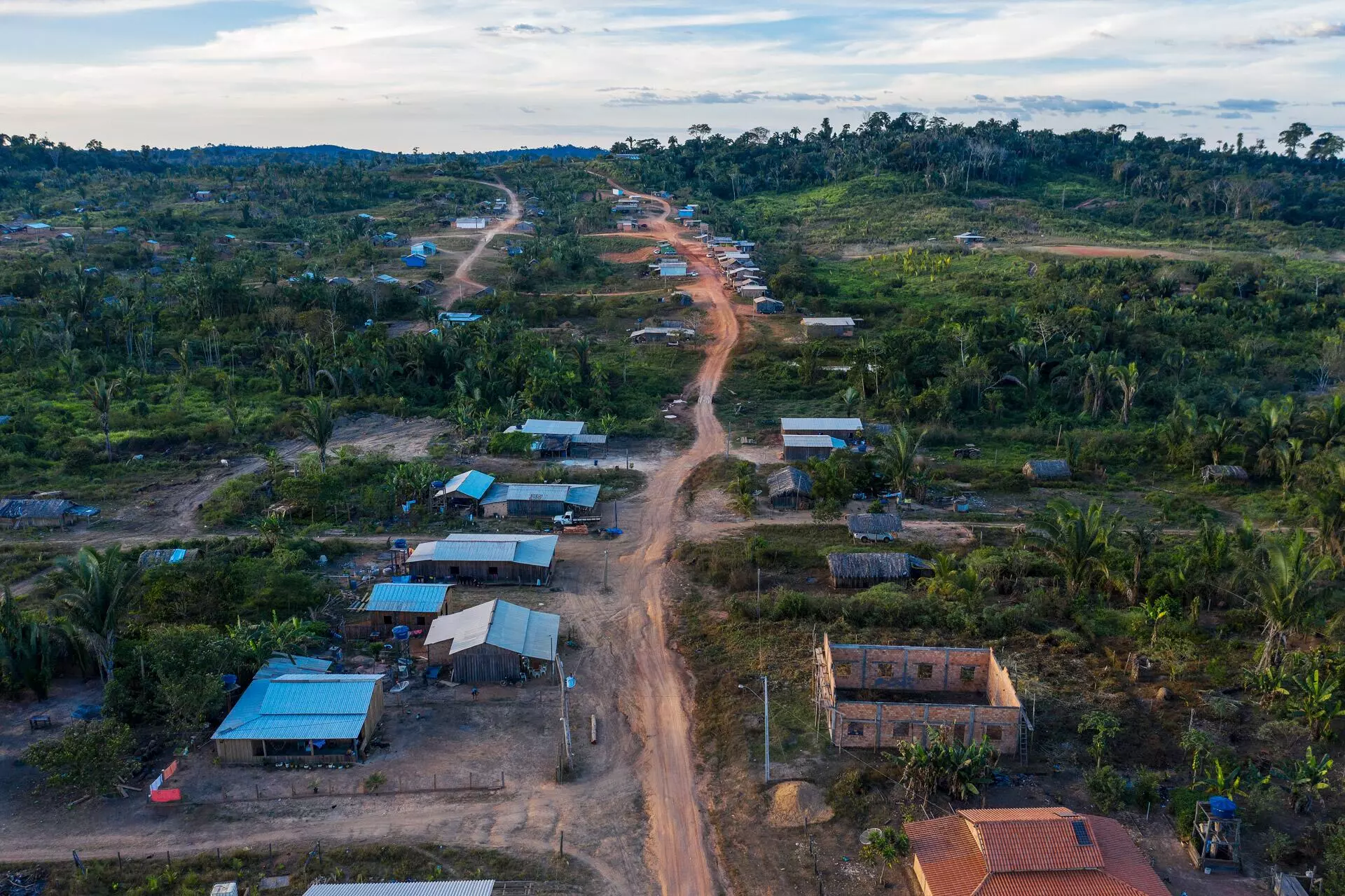They wandered the rubble, seeking shelter in a landscape of ruin. The houses where they once lived had been demolished, but the scent, the memory, some reference to home lingered on. Hundreds of cats and dogs are now roaming Apyterewa Indigenous Territory, land of the Parakanã people, in the state of Pará. From October to December of last year, the most deforested region of the Brazilian Amazon went through a long, tense process in which illegal invaders were driven off Indigenous lands. The eventual departure of all illegal ranchers has left an unforeseen legacy: an “exorbitant number of abandoned cats and dogs,” according to a document drawn up by staff from Brazil’s environmental protection agency Ibama, who have launched a campaign to find homes for these animals.
At the beginning of the expulsion process, federal agencies grappled with the logistical challenge of removing 60,000 head of cattle from the area, which over the decades had become a veritable “gated community of illegal ranches,” in the words of Christina Wippich Whiteman, an environmental analyst with Ibama. Christina leads the environmental authority’s teams in the Apyterewa operation. “If you look at the map, more than 50% of the Indigenous territory had been taken over by invaders. These people’s main activity was cattle ranching, but there were also many who came just to deforest,” the analyst explains. During this onslaught of illegal operations—cattle ranching, logging, and land-grabbing—the invaders brought their pets along. But when forced to leave under legal orders, they deserted the animals.

A new home: Brazil’s environmental agency and the National Animal Protection Forum have set up a website where the rescue animals can be adopted. Photo: reproduction
Ibama gave the ranchers until January 31 to remove the cattle from their illegal farms. Strong economic interest prompted most of them to do so. But dogs, cats, pigs, and chickens were left behind, completely lost and abandoned. The National Animal Protection Forum, Ibama, and other volunteer partners have organized a national campaign to find homes for the cats and dogs and have set up a website (www.adoteapyterewa.com.br). There are transportation difficulties in removing the animals from the Apyterewa Indigenous Territory, which covers almost 3,000 square miles and was ratified by the federal government in 2007. Ibama has secured a pledge from the Brazilian airline GOL to fly the adopted animals out of the Marabá city airport for free.
With authorization from Ibama, invaders also rescued some of their pigs and chickens before January 31. But many of these animals still remain in Apyterewa. The environmental agency is waiting for the Municipality of São Félix do Xingu and the Pará state agricultural defense agency to take the initiative in these cases.
Located just a few yards from a protection base of Brazil’s federal agency of Indigenous affairs Funai, the village of Vila Renascer was the symbol of the invasion in Apyterewa. The small community was completely dismantled on December 14, 2023. From then on, the animals’ precarious situation became more apparent. Roving the area at will, the cats and dogs were more frequently spotted at the protection base, where more than 200 staff members have been stationed during the operation to expel the invaders.
Staff improvised shelters and feeding stations for the non-humans who had been left behind. “We made use of the structures, despite the demolition, and improvised six makeshift shelters there,” says Christina. Fifteen feeding and watering stations were set up for the animals, with civil servants working on a volunteer basis. The environmental authority also called in the nongovernmental organization Disaster Animal Rescue Group, which is collaborating with treatment efforts. The Veterinarians of the Amazon Project, with help from the Federal Rural University of the Amazon, is spaying and neutering the animals. By the first week of February, 109 of the 120 registered animals had been sterilized. “But there are [roads opened by the invaders] that are still filled with animals, and we haven’t even begun rescue efforts,” says Ibama analyst Cristina.

Brazenly illegal: Vila Renascer, a few yards from a Funai base, was built by invaders and completely demolished in December 2023. Photo: Lalo de Almeida/Folhapress
More than 3,300 pounds of pet food have already been brought into Apyterewa. “Right now, our teams are in the field feeding the animals, with donations and purchases from Ibama. We’re also trying to get support from the municipality [of São Félix do Xingu], which is actually responsible for animal disease control there,” says Christina. The municipal health department has done leishmaniosis testing and rabies vaccinations, in addition to providing hospital supplies for spaying and neutering.
Ibama has transported some animals to nearby municipalities, such as Tucumã, Ourilândia do Norte, and São Félix do Xingu, when people have shown interest in adopting them. Relocating the animals is not the environmental agency’s responsibility, but Ibama staff members were concerned over the crime of animal mistreatment. The agency awaits the Federal Public Prosecutor’s Office to hand down decisions so the municipality can assume some legal responsibilities. If the animals remain in the Indigenous territory, it might have unpredictable consequences, warns the Ibama analyst.
“If the animals stay in this environment, they’ll become feral and enter the local wildlife food chain. If a jaguar finds a pig in the middle of the forest, it will be easy prey. Some dogs can survive off game and this will impact the environment,” Christina points out.
Based on aerial reconnaissance conducted in the second week of February, some 10,000 head of cattle must still be moved off the Indigenous territory. As the greatest victims of the human greed now destroying the forest, these animals usually go to slaughter. But dogs and cats, at least, can be given a new home. And a fresh start.
Report and text: Malu Delgado
Fact-checker: Plínio Lopes
Proofreader (Portuguese): Valquíria Della Pozza
Spanish translation: Julieta Sueldo Boedo
English translation: Diane Whitty
Photo Editor: Lela Beltrão
Layout and finishing: Érica Saboya
Editors: Viviane Zandonadi (editorial workflow and copy editing), and Talita Bedinelli (editor-in-chief)
Director: Eliane Brum

Makeshift havens: amid the destruction, staff and volunteers improvised feeding stations and shelters. Photos: Ibama/Courtesy of Operação Desintrusão Apyterewa





